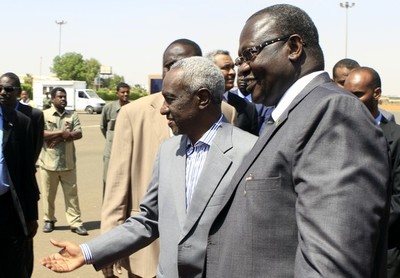Sudan and South Sudan agree to back efforts for peace in the two countries
July 1, 2013 (KHARTOUM) – Sudan and South Sudan agreed Monday to refrain from supporting rebel groups and instead, to back efforts aiming to bring peaceful settlement in the two countries.

Following the end of the two day talks in Khartoum, Sudan’s Ali Osman Taha and South Sudan’s Riek Machar issued a nine-point communiqué announcing that the agreed to refrain from supporting and harboring armed groups from both sides in line with the security arrangements deal.
The parties also agreed to refer their complaints and claims to a joint committee to examine it and take the necessary measures to stop it.
The joint statement also says the two parties agreed, for the first time, to “support initiatives aiming to bring peace and stability in the two states”.
South Sudan ruling party has been offering to mediate between its former comrades – SPLM-N – and the Sudan’s government in order to find a peaceful political solution to the war.
But Khartoum refused such role and said Juba has first to stop its support to the Sudanese rebels and disengage with them.
The African Union mediation team gathered government and rebel delegations last April but they failed even to agree on the agenda of the discussions as the SPLM-N demands a humanitarian agreement to be signed first, a matter that the government considers secondary and says priority should be given to a political deal.
However it is not clear if the South Sudanese government will seek to facilitate the resolution of the conflict with SPLM-N alone or with the rebel alliance, Sudanese Revolutionary Front, including the other rebel groups that hail from Darfur region.
The 1 July agreement between the two Sudans averted a crisis that threatened immediate oil shut down when president Omer Al Bashir three weeks ago ordered his for a shutdown of the oil pipelines transporting South Sudan’s crude oil through Sudan’s territory.
Bashir accused South Sudan of supporting the rebels of the Sudan Revolutionary Front (SRF), but Juba rejected the accusations and counter-accused Khartoum of arming its rebels in South Sudan such as David Yau Yau.
South Sudan’s vice president, Riek Machar, on Sunday led a high level ministerial delegation from Juba to Khartoum to defuse the tensions and set the two countries on the right footing.
Machar upon arrival in Khartoum met with President Al-Bashir and his first Vice President, Ali Osman, where they had separate heated debates, particularly over the alleged support of rebels in each country, but finally decided to discuss and resolve them.
Khartoum said the threat to shutdown South Sudan’s oil flow through its territory would be lifted if the two sides came to understanding and resolved the disputes affecting the cooperation agreements within the next 37 days.
The two parties also discussed the fate of Abyei and the establishment of the centerlines at the border in accordance with the security arrangements, pending the demarcation of the over 2,000kms borders between the two countries.
During the two days negotiations in Khartoum, the two parties have been exchanging their position papers proposing the approaches on how the issues could be tackled.
After issuing the joint statement late evening at 10pm, Machar and his counterpart, Taha, made positive statements recommitting the two nations to peaceful dialogue.
Taha called for a speed implementation of the agreed texts and stressed that direct bilateral talks do not mean a setup in the commitment of the two parties to inform the African Union mediation about the outcome of Khartoum meetings or to resort to the penal in the event of a difference between the two sides.
Machar reiterated the readiness of his government to implement what has been agreed and expressed South Sudan’s desire to have good relations with its northern neighbour. He added that all the differences between the two countries are resolvable though dialogue.
The communiqué said the two delegations agreed to normalize and promote the bilateral relations between the two countries and operationalize mechanism for implementation, monitoring and evaluation of the cooperation agreements.
The two parties reiterated their acceptance of the proposals of the AUHIP on the current stalemate, and call on the African Union and the Chairperson of IGAD, the Prime Minister of Ethiopia, to expedite the immediate implementation of the AUHIP proposal.
They also vowed to work together to fix the outstanding issues particularly Abyei and disputed borders, the statement said.
The disputes are a threat to the bilateral relations between the two neighbouring countries and affect their economies which largely depend on oil revenues.
The dollar exchange rate against the Sudanese pounds reportedly dropped significantly from Sunday as the markets felt the prospect of a peaceful resolution to the disputes between the two countries.
Machar and his delegation are expected to return to Juba on Tuesday.
(ST)
